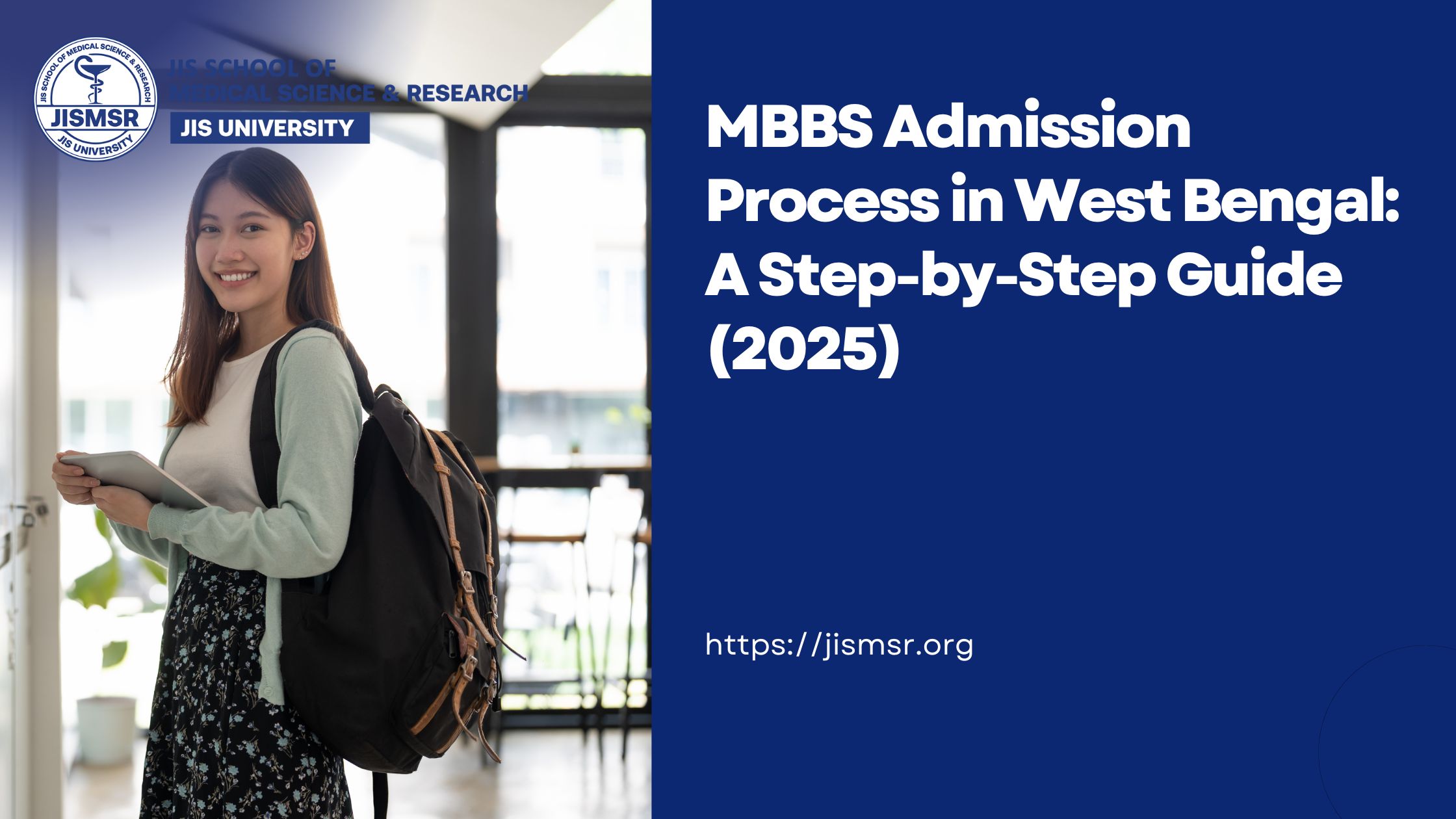Choosing medicine is simultaneously noble and pragmatic: noble because it commits one to lifelong care of others; pragmatic because the path is structured and rule-bound. For aspirants targeting MBBS seats in West Bengal in 2025, clarity about the procedure saves months of anxiety and positions you to make confident choices—whether you aim for a government college, a private institution, or a reputable private medical school such as JISMSR. Below is a compact guideline that explains the process step by step, clarifies required documentation, and offers strategic counsel for the competitive months ahead.
1. Know the single gatekeeper: NEET-UG
Admission to MBBS across India is governed by the National Eligibility cum Entrance Test (NEET-UG), administered by the National Testing Agency (NTA). Your NEET score is the primary criterion for merit lists, rank lists and counselling. Ensure you meet NEET eligibility (age and academic prerequisites) before applying.
Action: Monitor the NTA announcements for registration windows, exam date, and the information bulletin. Missing the registration window is an avoidable mistake.
2. Prepare meticulously for the exam
NEET tests knowledge and exam temperament. Beyond curriculum mastery (Physics, Chemistry, Biology), practice full-length mock tests under exam conditions, develop time management skills, and refine negative-marking strategies.
Action: Create a revision schedule, solve previous years’ NEET papers, and take subject-wise timed drills twice weekly.
3. Get your documents in order
After your NEET scorecard is out, you will need several documents for counselling and verification. Typical checklist:
- NEET scorecard and admit card
- Class X (birth date) certificate
- Class XII mark sheet and pass certificate (Physics, Chemistry, Biology and English)
- Photo ID (Aadhaar / Passport / Driving licence)
- Recent passport-size photographs
- Category certificate (SC/ST/OBC) if applicable
- Domicile / nativity certificate for state quota (if applying under West Bengal quota)
- PwD certificate (if applicable)
- Migration / transfer certificate (if required)
Action: Have both originals and multiple photocopies; scan digital copies for online uploads.
4. Understand quota streams: All-India vs State counselling
MBBS seats are allocated through distinct counselling streams. Typically:
- All-India Quota (AIQ) — central counselling (conducted by the Medical Counselling Committee) for the declared percentage of seats open nationally.
- State Quota — West Bengal conducts its own NEET-based counselling for state quota seats and for many private colleges that participate in the state process.
- Deemed / Central / Private Management Quota — separate processes and rules may apply.
Action: Decide early whether you will participate in AIQ and/or West Bengal state counselling; you can register for both where eligible.
5. Register for state counselling and fill choices
After NEET results, the West Bengal counselling authority opens online registration for state counselling. You must:
- Register on the state portal and link your NEET details.
- Upload documents and get provisional verification (as per the portal’s process).
- Carefully exercise your choice of colleges and courses (choice filling).
- Lock choices before the deadline.
Choice filling is strategic: rank options not by prestige alone but by realistic cutoffs, clinical exposure, and financial fit.
6. Seat allotment, reporting and document verification
Seat allotment is based on NEET rank, category, and seat preferences. If allotted a seat:
- Download allotment letter.
- Report to the designated reporting centre/college within the stipulated time for document verification.
- Pay the required fees to confirm the admission.
If you do not take the allotted seat, know the implications for subsequent rounds—non-reporting could foreclose upgrade options in some rounds.
7. Subsequent rounds, waiver and mop-up
Counselling typically proceeds through multiple rounds (e.g., Round 1, Round 2, Mop-up). Upgradation, surrender and movement across rounds are governed by specific rules.
Action: Read the counselling prospectus carefully: rules regarding resignation, fee refunds, and seat surrender vary and can affect future eligibility.
8. Financial, logistical and academic considerations
- Fees and loans: Private colleges can be costly; investigate scholarships, institutional fee concessions, and education loans well before final acceptance.
- Clinical exposure: Verify hospital attachments and patient inflow—clinical experience is pivotal in medical training.
- Accreditation & recognition: Ensure the college and MBBS program are recognized by the National Medical Commission (NMC).
Institutes like JISMSR typically emphasize clinical training, modern facilities and mentorship—features that merit consideration during choice filling.
9. Final formalities and joining
Once verification and fee payment are complete, complete college formalities: anti-ragging affidavits, hostel admission (if required), and medical checks. Attend orientation and start the intensive MBBS curriculum.
Strategic takeaways
- Treat NEET as the single pivot of your admission strategy; every subsequent step derives from that score.
- Document readiness and timely portal actions distinguish successful candidates in tightly scheduled counselling windows.
- Use multiple information channels—official portals, recognized college pages, and verified counsellor guidance—but always confirm via the official counselling prospectus.


